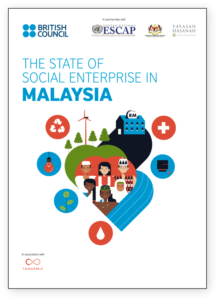By Julian Theseira
According to the 2018 social enterprise survey, more rural states in Malaysia have similar or more numbers of social enterprises than wealthier and more urbanized states. What could explain such disparities and why does it matter?
The recently published State of Social Enterprise in Malaysia 2018 report provides an overview of the social enterprise ecosystem in the country. The report, which was commissioned by the British Council and supported by United Nations Economic and Social Commission for Asia and the Pacific (UNESCAP), Ministry of Entrepreneur Development, and Yayasan Hasanah, shows that a range of stakeholders in Malaysia including policymakers and investors are increasingly interested in social enterprises.
An interesting set of findings from the report is the data regarding the geographic distribution of social enterprises across the different states in Malaysia. The findings, based on a survey of social enterprises carried out between July and November 2018 by Tandemic, are plotted against a map of Malaysia in the report. The map vividly illustrates the concentration of social enterprises in the Klang Valley, the country’s main economic region, as 66% of social enterprises in Malaysia are located in Kuala Lumpur (39%) and Selangor (27%). The map however also illustrates some surprising findings from the survey. According to the survey some of the more rural states in Malaysia have similar numbers of or more social enterprises than more urbanized states. For example, Kelantan, Sabah, and Sarawak, all largely rural states, each are home to 7% of social enterprises in Malaysia. An urbanized state like Penang is meanwhile the base for only 8% of social enterprises in Malaysia while a relatively urbanized state like Johor only contains 2% of social enterprises in Malaysia.
The report does not investigate the reasons for these surprising variations in the geographic distribution of social enterprises across different states in Malaysia however this could be a very fruitful avenue of further research. The survey designers noted during the launch of the report that the findings could have been skewed because alongside the survey they had also conducted workshops in Kota Kinabalu, Sabah and Kota Bharu, Kelantan to engage social entrepreneurs, which could have led to an increase in the numbers of survey respondents from these states. The survey was also conducted in English, which could have reduced the number of respondents from largely rural states such as Kedah and Terengganu, where people may not feel comfortable responding to a study using a foreign language. Further research is however necessary to determine if the variations in the geographic distribution of social enterprises across Malaysia presented in the report is merely due to limitations of the survey methodology or because of differences in the economies and cultures of the various states.
For instance, there are anecdotal accounts that people from Kelantan, especially the women, are very entrepreneurial. It would be interesting to investigate if there is actual evidence to support these anecdotes, and also to analyse how and why Kelantanese culture may be supportive of social enterprises. It would also be fruitful to study if aspects of the entrepreneurial culture of Kelantan, if it really exists, can be effectively replicated in other states in Malaysia through policies and other stimulus measures in order to cultivate the growth of entrepreneurship, especially social entrepreneurship. It would also be interesting to investigate why a state such as Johor that is relatively urbanized and wealthy due in part to its proximity to Singapore has so few social enterprises. An understanding of the factors limiting social entrepreneurship in Johor could also lead to the formulation of policies that more effectively cultivate the growth of a viable social entrepreneurship ecosystem in Malaysia and ensure that social enterprises are well distributed across states so that they also support local economies.
The State of Social Enterprise in M alaysia 2018 report provides a snapshot of the current social enterprise landscape. Hence it leaves its readers with more questions than answers and opens up potentially fruitful avenues for further research. Such research will be essential to gather further evidence about social enterprises which can then inform evidence-based policymaking that will effectively support the growth of social entrepreneurship in Malaysia.
alaysia 2018 report provides a snapshot of the current social enterprise landscape. Hence it leaves its readers with more questions than answers and opens up potentially fruitful avenues for further research. Such research will be essential to gather further evidence about social enterprises which can then inform evidence-based policymaking that will effectively support the growth of social entrepreneurship in Malaysia.
To learn more about the social enterprise ecosystem in Malaysia, please consult The State of Social Enterprise in Malaysia 2018 report here.


